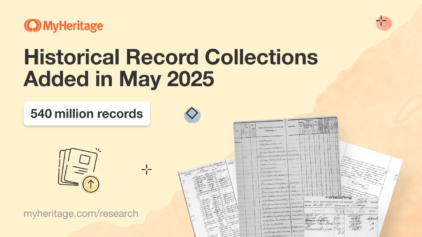

Online databases are the most common way to search for your family in African archives. However, it can be a challenging and frustrating experience if you don’t know where to look. African archives are not as complete or accessible as others, with genealogists relying heavily on oral history and local documents, which may not be digitized.
African historical records can be difficult to navigate due to the continent’s colonial history. Many researchers take a DNA test as a starting point for their search, potentially identifying distant relatives and geographical areas of interest.
However, you can still search online databases and apply the same best practices as you would for genealogical searches in other continents. Before starting your search, read our guide on what you must consider when researching African American genealogy.
How to Start Your Family Research in African Archives
Living relatives are crucial when you’re researching your family tree. Start by interviewing elders about their generations and those before them. Family stories and clan affiliations can be vital resources later in your search.
Identify regions to focus your search on by gathering confirmed information about names, dates, and locations. Having help from older relatives and family friends is ideal, as they may understand the local naming system and have insights into relevant kinship structures.
Records to Use During an African Genealogy Search
Exploring African archives online isn’t always straightforward. South African genealogy records showcase the common challenges. Records pre-dating the Dutch arrival in 1652 and British Rule in 1806 are hard to find, primarily consisting of church documents. Even comparatively modern documents can be scarce. For example, while South Africa held its first census in 1856, official recording only began in 1911. This scenario is common throughout African archives.
Here are the records to focus on when researching your family tree in Africa:
- Clan genealogies: Usually made up of oral histories, these records are compiled by community historians and local groups.
- Church records: Records from church mission groups can provide information about ancestors during their early education, while churches may have registers for baptisms, marriages, and burials.
- Land and property records: Post-independence records in some African countries may provide clues for ancestors, along with tribal land registers.
- Colonial administrative records: Depending on your timeline, records maintained by colonial authorities may include migration permits, tax lists, and court records.
- Migration records: The Trans-Atlantic slave trade database, created in 1990, contains information for over 11,000 maritime voyages to the Americas. It’s also worth exploring records for others in Africa where your ancestors may have migrated post-independence, such as Sierra Leone.
How to Access African Archives for Genealogy Searches
Most major African countries have their own national archives, including Nigeria, Kenya, and Ghana. Unfortunately, not all of these are fully digitized, and it can be challenging to get access to them.
The National Archives and Records Service of South Africa (NARSSA) provides free access to an extensive array of genealogical records, including immigration information. Similarly, the South African National Library and Information Consortium (SANLIC) provides access to online resources, including directories and historical newspapers.
Colonial archives can also hold family information, but these are typically held at archives in the nation’s capital, such as London and Paris, and are not as accessible. Similarly, religious institutions that were active in the region may also have documents, including diocesan archives and church mission societies.
Online databases are the best place to start your search for African archives. On MyHeritage, you’ll find a range of digitized documents, including vital records and land records. Our database is updated with new documents on a monthly basis, so it’s good practice to recheck regularly for new records.
Search for Your Family with African Historical Records on MyHeritage
The key to searching for your family history in Africa is to gather both oral and written information. Your genealogical search will take time, but it’s one of the most worthwhile things you can do. Preserve and uncover your family’s unique stories to feel more connected to your heritage.
Discover your roots by signing up for a free trial of MyHeritage today to solve the mysteries in your family tree.










